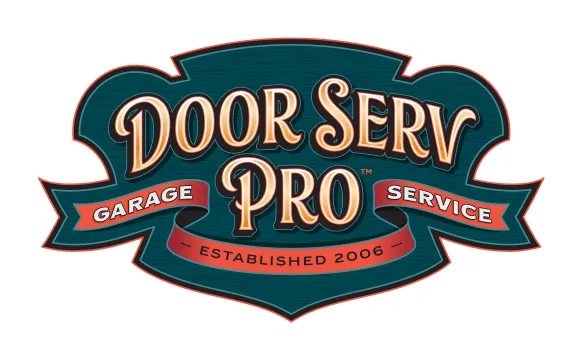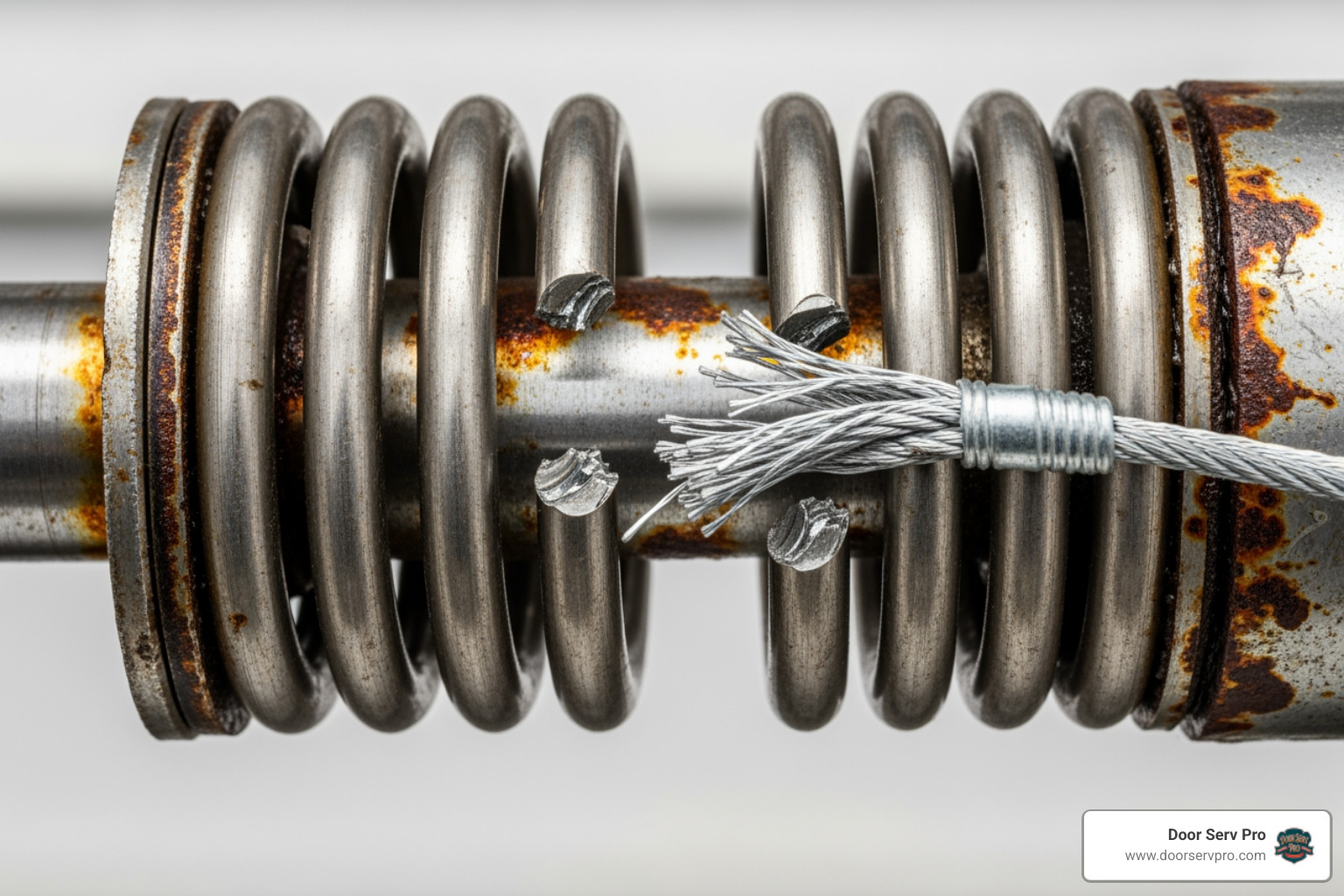When Your Garage Door Spring Breaks in Inwood, WV
If you've got a broken garage door spring inwood wv, you're likely dealing with a garage door that won't open, an opener that's straining, or a door that feels impossibly heavy. That loud "bang" you heard wasn't your imagination—it was the sound of a spring snapping under tension. A broken spring means your door has lost its counterbalance system, and trying to operate it can damage your opener or cause injury.
Quick Answer: What to Do About a Broken Garage Door Spring in Inwood, WV:
- Don't attempt to open the door - It's extremely heavy without spring support (400+ pounds)
- Disconnect your opener - Running it with a broken spring will damage the motor
- Call a professional immediately - Spring replacement requires specialized tools and safety training
- Expect both springs to be replaced - If one broke, the other is likely near failure
For comprehensive garage door services in West Virginia, visit our garage door services page, or if you need immediate repair help, schedule your spring repair service now.
The good news? Professional spring replacement is straightforward when handled by certified technicians with the right equipment. Door Serv Pro has been serving Inwood homeowners for over 25 years, and we understand that a broken spring means your daily routine is disrupted. Most spring repairs can be completed the same day, getting your garage door back to safe, reliable operation quickly.

Telltale Signs Your Garage Door Spring is Broken
There's nothing quite like the panic of a garage door refusing to cooperate when you're trying to leave for work or get the kids to school on time. If your garage door is acting up in Inwood, WV, a broken spring is often the culprit—and it usually announces itself in some pretty dramatic ways.
The good news? Springs don't fail silently. They give you clear warning signs that something has gone seriously wrong. Here's what to watch for.
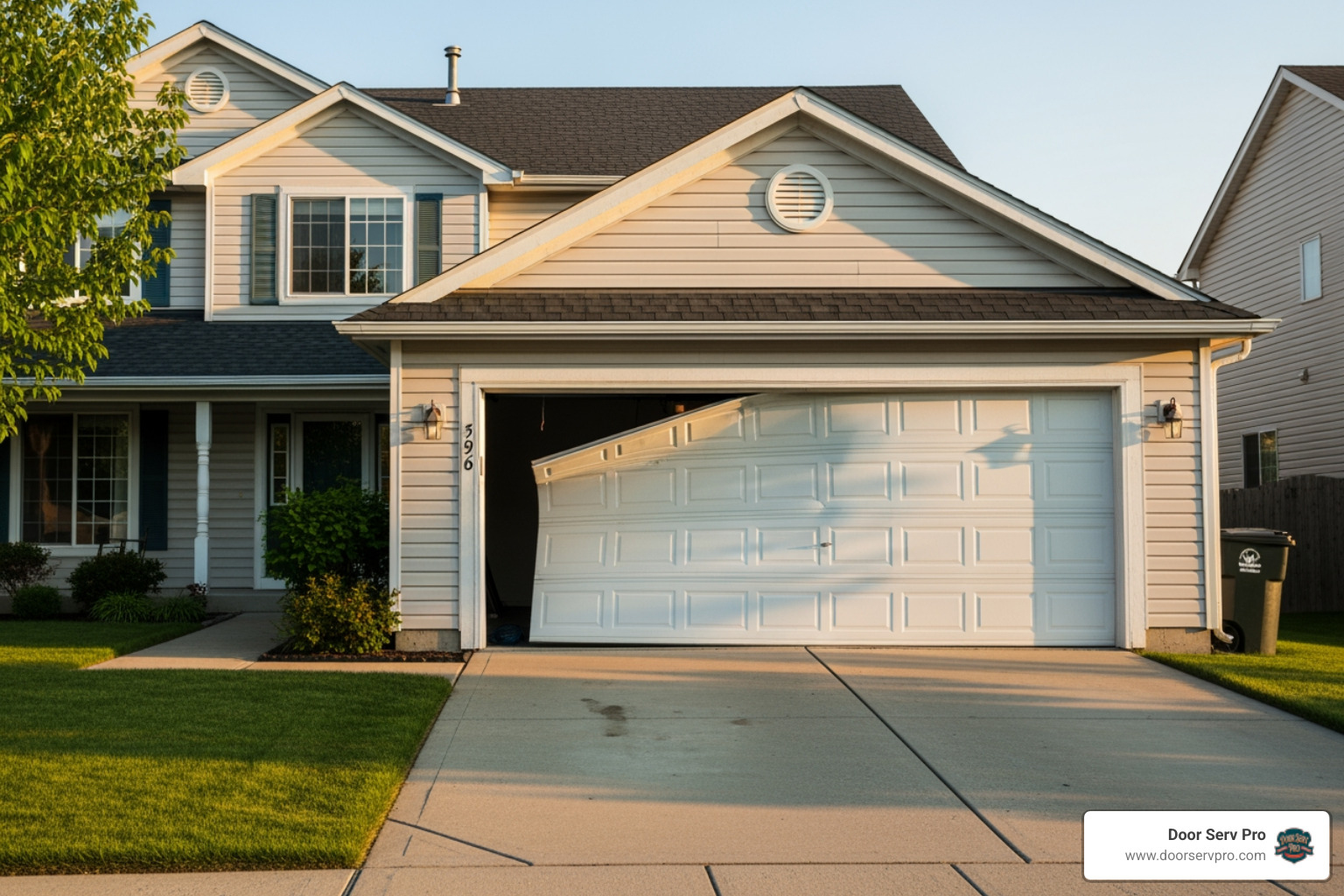
The Loud "Bang"
If you've ever been startled by a sudden, sharp bang from your garage, you might have just heard your spring break. Homeowners describe it as sounding like a gunshot, a firecracker going off, or something heavy crashing to the floor. It's loud enough to wake you from a dead sleep.
This dramatic noise is actually the sound of metal snapping and releasing all its stored tension at once. Think of it like a rubber band breaking while stretched—except this "rubber band" is a heavy-duty steel coil under hundreds of pounds of pressure. That explosive release of energy creates an unmistakable sound that you won't soon forget.
If you heard that bang and now your door won't open, you've got a broken garage door spring inwood wv on your hands.
A Visible Gap in the Spring
Once you've heard that alarming sound, a quick visual check will usually confirm your suspicions. For torsion springs—the kind mounted on a bar directly above your garage door—you'll notice a clear separation in the coil. There will be a gap of an inch or two where the spring snapped, almost like someone cut it with invisible scissors.
If you have extension springs, which run along the sides of your door tracks, the break looks different. You might see one spring stretched out and dangling uselessly, or completely detached from its mounting bracket. Either way, this physical separation is your door's way of waving a white flag.
This is one of the easiest signs to spot, and it's a definitive indicator that professional repair is needed.
The Door Won't Open (Or is Extremely Heavy)
Here's where things get really frustrating. Without working springs, your garage door has lost its counterbalance system—the mechanism that makes a 400-pound door feel light as a feather.
Your garage door opener might try its best, making all kinds of straining noises, but the door will barely budge. It might lift a few inches and then stop, or it won't move at all. The opener simply isn't designed to lift the full weight of the door on its own.
If you disconnect the opener and try to lift the door manually, you'll quickly understand why. It will feel impossibly heavy—like you're trying to deadlift a small car. If you can lift it at all, it will take every ounce of strength you have.
You might also notice the door hanging crooked or uneven when you attempt to open it, with one side higher than the other. This lopsided appearance is another telltale sign of a broken spring throwing the entire system out of balance.
When your door refuses to cooperate like this, don't keep trying to force it. That's how you end up with a damaged opener on top of a broken garage door spring inwood wv. Instead, it's time to call Door Serv Pro for professional spring replacement that gets you back on track—usually the same day.
Torsion vs. Extension Springs: Understanding Your Garage Door's System
Before we get into the repair process, let's talk about what's actually holding up your garage door. There are two main types of spring systems, and knowing which one you have can help you understand what happened when that broken garage door spring inwood wv decided to call it quits.
| Feature | Torsion Springs | Extension Springs |
|---|---|---|
| Location | Mounted horizontally on a metal shaft directly above the garage door opening. | Mounted vertically along the sides of the garage door tracks, stretching and contracting as the door moves. |
| Lifespan | Generally rated for 20,000 cycles or more. High-performance options can reach 30,000 cycles. | Typically rated for 10,000 cycles. |
| Safety | Considered safer because when they break, they usually remain on the shaft, minimizing risk of injury from flying parts. | If they break, they can snap and fly, posing a significant safety hazard. Requires safety cables threaded through them to contain potential breakage. |
| Common Use | Modern standard for most residential garage doors, especially heavier or double doors. | Often found on older or lighter garage doors. |
Torsion Springs: The Modern Standard
If you've got a newer home in Inwood, you probably have torsion springs. These are mounted on a horizontal metal shaft right above your garage door opening. Think of them like a giant mechanical muscle that twists up tight when your door closes, storing all that energy, then unwinds to help lift the door back up.
The real advantage here is longevity. Torsion springs are typically rated for 20,000 cycles or more—and a cycle is just one complete open-and-close of your door. For most families, that translates to somewhere between 7 to 10 years of daily use. If you're willing to invest a bit more upfront, high-performance torsion springs can last even longer, rated for up to 30,000 cycles.
But here's the safety bonus: when a torsion spring breaks, it usually stays put on its shaft. There's no flying metal or dangerous whipping action. The spring just develops that visible gap we talked about earlier and stops working. This "safer containment" is one of the main reasons torsion springs have become the modern standard for garage doors. You can learn more about how these systems work on Wikipedia's garage door page.
Extension Springs: The Older System
Extension springs are the older technology, and you'll typically find them on garage doors installed before the 1990s or on lighter, single-car doors. Instead of sitting above the door, these springs run along both sides of your garage door tracks. They work by literally stretching out as the door closes (storing energy) and contracting back as the door opens (releasing that energy to help lift).
The downside? Extension springs have a shorter lifespan, usually around 10,000 cycles. That means they'll need replacing roughly twice as often as torsion springs.
More importantly, when an extension spring breaks, it can be downright dangerous. Because these springs are under such high tension, they can snap with tremendous force and go flying. That's why safety cables should always be threaded through the center of extension springs—they act like a tether, keeping the broken spring from becoming a projectile. If you have extension springs and you don't see safety cables running through them, that's a serious safety concern that needs addressing right away.
At Door Serv Pro, we've seen plenty of both systems in our 25 years serving Inwood homeowners, and we can work with whatever type of spring your door has. Understanding your system helps you know what to expect when it's time for repairs or an upgrade.
The Dangers of DIY and What to Expect from Professional Service
If you're considering tackling a broken garage door spring inwood wv yourself, we need to have a serious conversation. We get it—you're handy around the house, you've watched a few YouTube videos, and you'd like to save some money. But garage door spring repair is genuinely one of the most dangerous home maintenance tasks you can attempt. These aren't the springs in your ballpoint pen. We're talking about tightly-wound coils storing enough energy to lift a 400-pound door, and when things go wrong, they go very wrong.
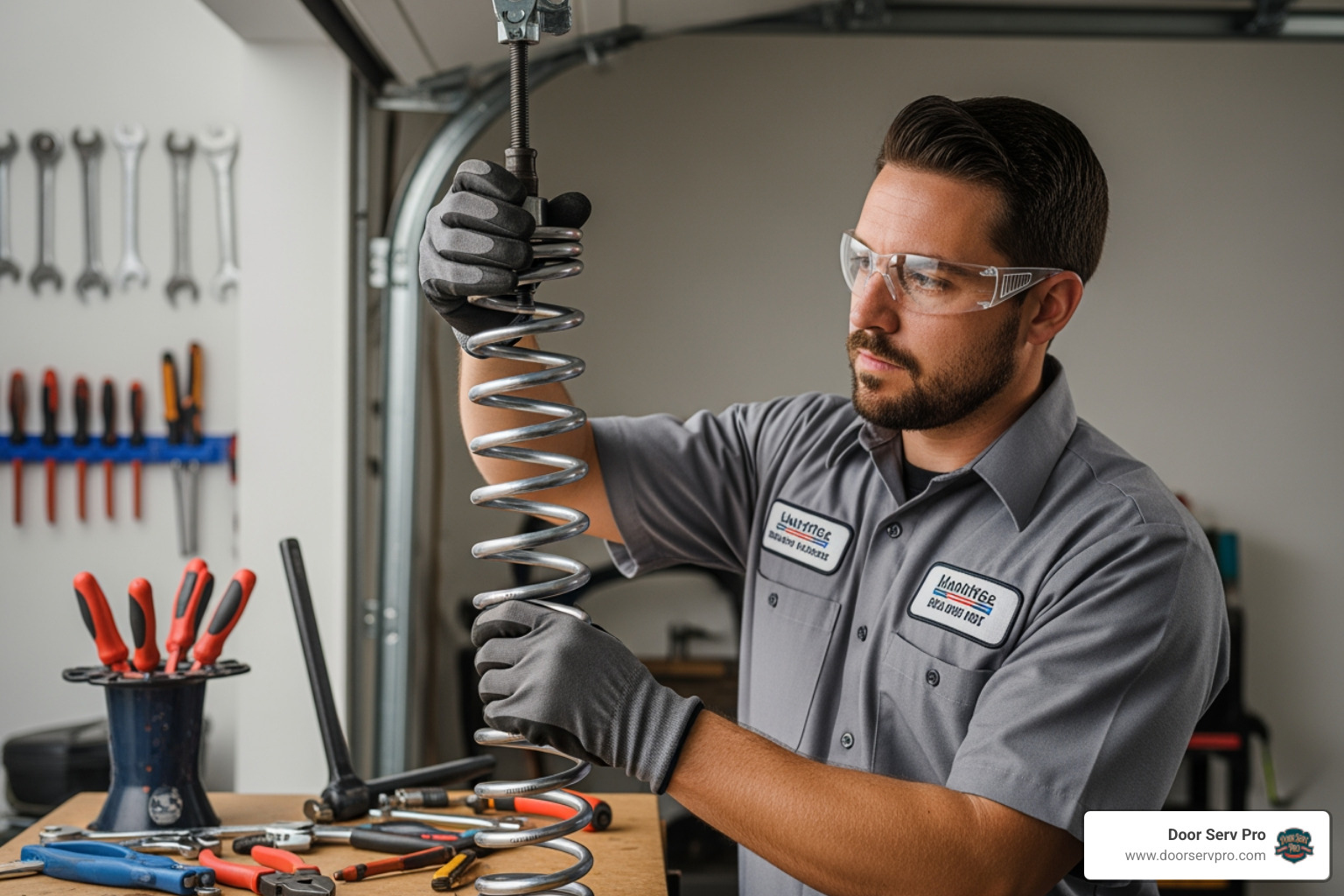
Why is DIY repair for a broken garage door spring in Inwood, WV a bad idea?
The tension in a garage door spring isn't just high—it's extreme. Think of it as a coiled cobra, ready to strike at the slightest provocation. When properly handled by trained technicians with the right tools, spring replacement is safe and straightforward. But without that training and equipment, you're essentially gambling with your safety and your property.
The stored energy in these springs can be released in a fraction of a second. We've seen DIY attempts result in broken bones, deep lacerations, and injuries that required reconstructive surgery. A spring or the winding bar used to tension it can become a projectile, striking with enough force to cause permanent damage. Your face, your hands, your chest—all are vulnerable if something slips.
Beyond the risk of severe injury, there's the very real possibility of property damage. An uncontrolled spring release can shatter windows, dent your car, or cause hundreds of dollars in damage to your garage door system itself. And here's something most homeowners don't realize: there are dozens of different spring sizes, each calibrated for specific door weights and heights. Installing the wrong spring creates an unbalanced door that will wear out your opener prematurely and could fail again unexpectedly.
We're not trying to scare you—well, maybe a little—but these are real risks that certified technicians train for years to manage safely. Your family's safety is worth far more than the cost of a professional repair.
The Professional Repair Process: Safety and Precision
When you call Door Serv Pro for your broken garage door spring inwood wv, you're getting more than just a repair—you're getting peace of mind. Our NATE-certified technicians have completed thousands of spring replacements over our 25 years serving Inwood families, and we follow strict safety protocols every single time.
The first thing our technician does is secure the work area and disconnect your garage door opener. This prevents any accidental activation while we're working. Safety isn't just a buzzword for us; it's the foundation of everything we do.
Next comes a step that separates professionals from amateurs: we actually weigh your garage door. This isn't a guess-and-check situation. We need to know the exact weight to select the perfect replacement springs. We carry 28 different spring sizes just for seven and eight-foot doors, because precision matters. The wrong spring means an unbalanced door, which means problems down the road.
Once we've selected the correct springs, we carefully remove the old ones and install the new springs using specialized tools designed specifically for this high-tension work. The tensioning process is where expertise really comes into play. Too little tension and your opener will strain; too much and you're creating a safety hazard. We apply exactly the right amount, then perform a balancing test to make sure your door stays put when lifted halfway and feels light to operate.
Finally, we conduct a comprehensive 20-point safety inspection of your entire garage door system—cables, rollers, tracks, hinges, everything. We want to catch any other potential issues before they become problems. For more details about our complete garage door services, including spring repair and system maintenance, visit our services page.
Should I replace both springs if only one is broken?
This is one of the most common questions we get, and the answer is almost always yes. Here's the thing: both of your springs were installed at the same time and have been opening and closing your door together, cycle after cycle, for years. They've lived the same life, experienced the same wear and tear, and accumulated the same stress.
When one spring breaks, the other is like a ticking time bomb. It's not a matter of if it will break, but when. Usually, that "when" is measured in days or weeks, not months. By replacing both springs at once, you're ensuring balanced tension on both sides of your door, which means smoother operation and less strain on your opener and other components.
Think of it this way: you wouldn't replace just one worn-out tire on your car when the others are equally worn, right? The same logic applies here. Replacing both springs simultaneously saves you from the hassle and expense of another service call in the near future when that second spring inevitably gives up. It's the smarter, safer, and more cost-effective choice for Inwood homeowners who want reliable, long-term performance from their garage door system.
Your Top Questions About a Broken Garage Door Spring in Inwood, WV
When you're dealing with a broken garage door spring inwood wv, you probably have questions racing through your mind – especially if this is your first time facing this issue. We've been helping Inwood homeowners for over 25 years, and these are the questions we hear most often. Let's clear up the confusion together.
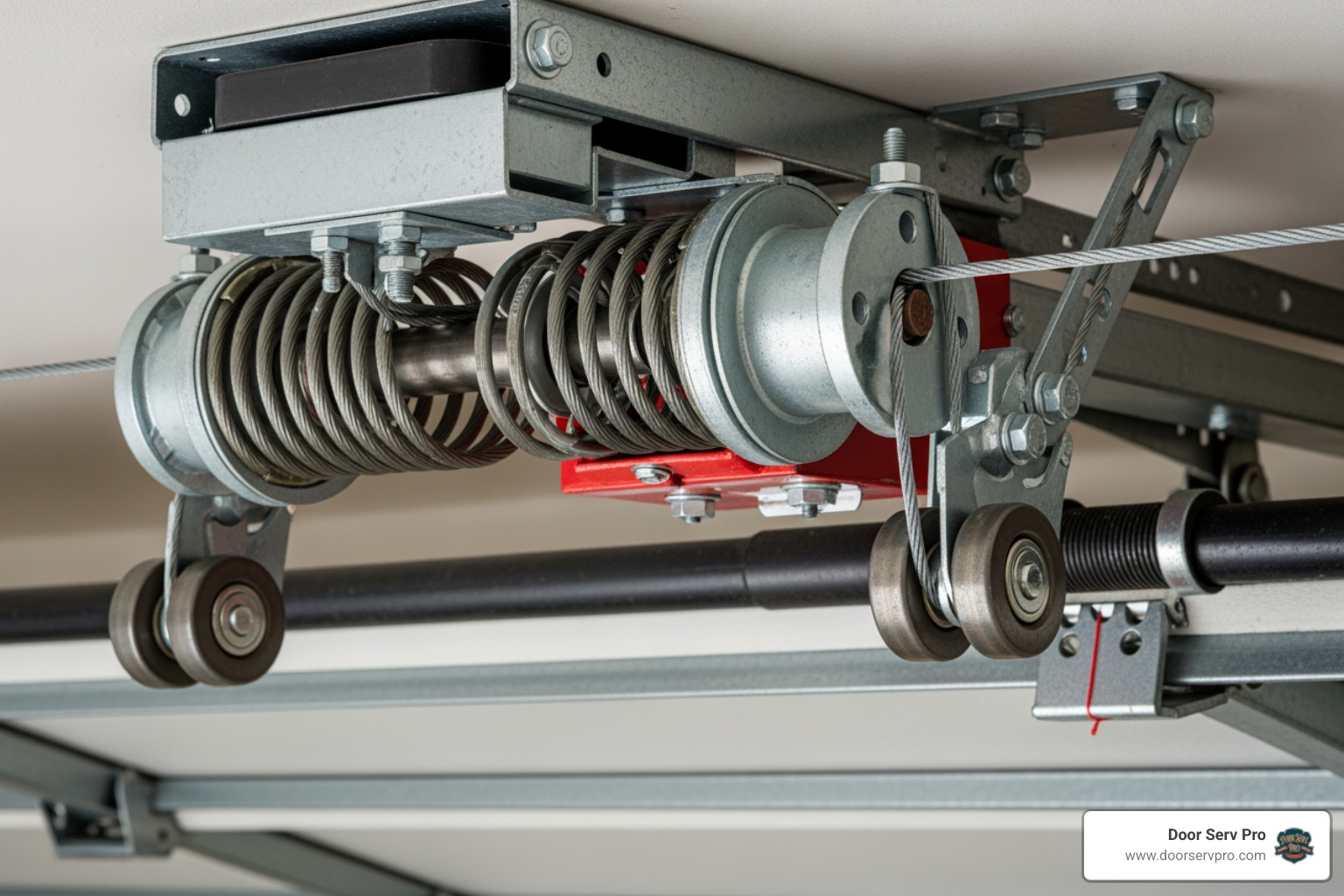
How does a broken spring affect my garage door opener?
Your garage door opener wasn't designed to be a weightlifter, yet that's exactly what it becomes when a spring breaks. Under normal circumstances, the springs do the heavy lifting – they counterbalance your door's weight so the opener only needs to provide a gentle nudge to get things moving. When a spring snaps, your opener suddenly has to lift the full weight of the door on its own.
Think of it this way: it's like asking someone who's used to pushing a shopping cart to suddenly push a car. The strain is enormous. Your opener's motor will work overtime, gears can strip, and the drive system can fail completely. What started as a broken garage door spring inwood wv can quickly become a much more expensive problem – a burned-out opener motor or damaged gears.
We've seen it happen countless times. A homeowner hears that bang, doesn't realize the spring is broken, and keeps using the opener. Within days or weeks, the opener gives up entirely. That's why we always stress: disconnect your opener immediately when you suspect a broken spring. For more information about protecting your opener and our installation services, visit our garage door opener services page.
How long do garage door springs typically last?
Here's something that surprises most homeowners: garage door springs aren't measured in years – they're measured in cycles. One cycle equals one complete opening and closing of your door. Most standard springs are rated for about 10,000 cycles, which translates to roughly 7-10 years for the average Inwood household.
But there's quite a bit of variation in that number. If you're someone who uses their garage door four or five times a day – maybe you work from home, have teenagers who are always coming and going, or just prefer parking in the garage – your springs might only last 6-7 years. On the flip side, if you use your door less frequently, you might squeeze 14 years out of them.
The quality of the springs matters tremendously too. Standard springs give you those 10,000 cycles, but high-performance torsion springs can be rated for 20,000 to 30,000 cycles. That's why we often recommend upgrading to these longer-lasting springs when we do repairs – they're an investment that pays off in years of reliable service and fewer repair calls down the road.
West Virginia's climate plays a role as well. Our humid summers and cold winters can be tough on metal components. Rust and temperature fluctuations can slowly wear down springs over time, especially if they're not properly maintained.
How can I extend the life of my garage door springs in Inwood, WV?
While springs will eventually wear out – it's just the nature of mechanical parts – you can absolutely help them last as long as possible. A little preventive care goes a long way, and it's much easier (and cheaper) than dealing with an emergency repair.
Regular lubrication is your first line of defense. Every few months, take a minute to apply a silicone-based lubricant to your springs. This simple step reduces friction and prevents rust from taking hold. Just avoid WD-40 – it actually attracts dirt and grime, which is the opposite of what you want. Think of lubrication like changing the oil in your car: a small effort that makes a big difference.
Professional annual inspections are worth their weight in gold. Our Door Serv Pro technicians can spot problems before they become emergencies. We'll check your door's balance, examine all the components for wear, and make adjustments that keep everything running smoothly. It's amazing how many major repairs we've prevented just by catching small issues during routine maintenance visits. You can learn more about our preventive services on our garage door maintenance services page.
You can also check your door's balance yourself periodically. Disconnect the opener (with the door closed), then manually lift the door about halfway. A properly balanced door should stay put right where you leave it. If it sags down or shoots up, that's a sign your springs are losing their tension and need professional adjustment.
Finally, listen to your door. If it feels heavy, makes grinding noises, or moves unevenly, don't ignore these warning signs. Forcing a struggling door puts enormous strain on the springs and can actually shorten their life. Address issues promptly, and your springs will thank you with years of reliable service.
The bottom line? A little attention now saves a lot of headaches later. And if you ever have questions or concerns about your garage door system, we're always just a phone call away.
Conclusion: Your Next Steps for Safe and Reliable Spring Repair
If you've made it this far, you understand that dealing with a broken garage door spring inwood wv isn't something to take lightly. It's not just about the inconvenience of being stuck in your driveway when you're already running late—it's about the real safety risks that come with a component under hundreds of pounds of tension. These springs aren't toys, and they're definitely not DIY weekend projects.
Throughout this guide, we've walked you through the warning signs that tell you a spring has failed: that unmistakable bang that sounds like a gunshot, the visible gap in the coil, and a door that suddenly feels like it weighs as much as a small car. We've explained the difference between torsion and extension spring systems, and why understanding your specific setup matters. Most importantly, we've been clear about one thing: attempting to replace a garage door spring yourself can result in serious injury, property damage, and even more expensive repairs down the line.
Your garage door is the largest moving part of your home, and it deserves professional attention when something goes wrong. At Door Serv Pro, we've been helping homeowners in Inwood, WV, and throughout the region for over 25 years. Our NATE-certified technicians don't just show up with the right tools—they bring decades of combined expertise, a commitment to safety-first practices, and a genuine understanding that when your garage door is out of commission, your whole routine is disrupted.
When you call us, you're getting more than just a spring replacement. You're getting a comprehensive 20-point safety inspection, precise door balancing, and the peace of mind that comes with our 100% satisfaction guarantee. We're a family-owned business, and we treat every home in Inwood like it's our own. Whether it's the middle of the day or the middle of the night, we're here to get your garage door back to safe, reliable operation quickly.
So if you're staring at a garage door that won't open, or you've heard that telltale snap, don't wait. Disconnect your garage door opener to prevent further damage, keep everyone away from the door, and give us a call. We'll handle the dangerous work so you don't have to.
Schedule your professional garage door repair today! Your safety, your home, and your family are worth it.
